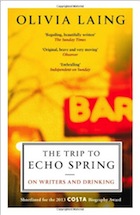The long list of male alcoholic authors is well known, but what about their literary sisters? Olivia Laing looks back on the great female writers who sought refuge in the bottle and salvation on the page

Marguerite Duras in France, c1955. Photograph: Robert Doisneau/Gett
If you write a book about alcohol and male writers, as I did, the one question you'll be asked more than any other is: what about the women? Are there any alcoholic female writers? And are their stories the same, or different? The answer to the first question is easy. Yes, of course there are, among them such brilliant, restless figures as Jean Rhys, Jean Stafford, Marguerite Duras, Patricia Highsmith, Elizabeth Bishop, Jane Bowles, Anne Sexton, Carson McCullers, Dorothy Parker and Shirley Jackson.
Alcoholism is more prevalent in men than women (in 2013, the NHS calculated that 9% of men and 4% of women were alcohol-dependent). Still, there is no shortage of female drinkers; no lack of falling-down afternoons and binges that stretch sweatily into days. Female writers haven't been immune to the lure of the bottle, nor to getting into the kinds of trouble – the fights and arrests, the humiliating escapades, the slow poisoning of friendships and familial relations – that have dogged their male colleagues. Jean Rhys was briefly in Holloway prison for assault; Elizabeth Bishop more than once drank eau de cologne, having exhausted the possibilities of the liquor cabinet. But are their reasons for drinking different? And how about society's responses, particularly in the lubricated, tipsy 20th century; the golden age, if one can call it that, of alcohol and the writer?
 In her 1987 book Practicalities, the French novelist and film-maker Marguerite Duras says many shocking things about what it means to be a woman and a writer. One of her most striking statements is about the difference between male and female drinking – or rather the difference in how the two are perceived. "When a woman drinks," she writes, "it's as if an animal were drinking, or a child. Alcoholism is scandalous in a woman, and a female alcoholic is rare, a serious matter. It's a slur on the divine in our nature." Ruefully, she adds a personal coda: " "I realised the scandal I was creating around me."
In her 1987 book Practicalities, the French novelist and film-maker Marguerite Duras says many shocking things about what it means to be a woman and a writer. One of her most striking statements is about the difference between male and female drinking – or rather the difference in how the two are perceived. "When a woman drinks," she writes, "it's as if an animal were drinking, or a child. Alcoholism is scandalous in a woman, and a female alcoholic is rare, a serious matter. It's a slur on the divine in our nature." Ruefully, she adds a personal coda: " "I realised the scandal I was creating around me."
More
Alcoholism is more prevalent in men than women (in 2013, the NHS calculated that 9% of men and 4% of women were alcohol-dependent). Still, there is no shortage of female drinkers; no lack of falling-down afternoons and binges that stretch sweatily into days. Female writers haven't been immune to the lure of the bottle, nor to getting into the kinds of trouble – the fights and arrests, the humiliating escapades, the slow poisoning of friendships and familial relations – that have dogged their male colleagues. Jean Rhys was briefly in Holloway prison for assault; Elizabeth Bishop more than once drank eau de cologne, having exhausted the possibilities of the liquor cabinet. But are their reasons for drinking different? And how about society's responses, particularly in the lubricated, tipsy 20th century; the golden age, if one can call it that, of alcohol and the writer?
 In her 1987 book Practicalities, the French novelist and film-maker Marguerite Duras says many shocking things about what it means to be a woman and a writer. One of her most striking statements is about the difference between male and female drinking – or rather the difference in how the two are perceived. "When a woman drinks," she writes, "it's as if an animal were drinking, or a child. Alcoholism is scandalous in a woman, and a female alcoholic is rare, a serious matter. It's a slur on the divine in our nature." Ruefully, she adds a personal coda: " "I realised the scandal I was creating around me."
In her 1987 book Practicalities, the French novelist and film-maker Marguerite Duras says many shocking things about what it means to be a woman and a writer. One of her most striking statements is about the difference between male and female drinking – or rather the difference in how the two are perceived. "When a woman drinks," she writes, "it's as if an animal were drinking, or a child. Alcoholism is scandalous in a woman, and a female alcoholic is rare, a serious matter. It's a slur on the divine in our nature." Ruefully, she adds a personal coda: " "I realised the scandal I was creating around me."More
No comments:
Post a Comment